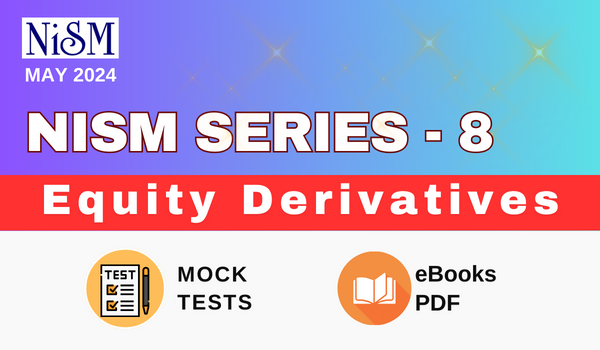The National Institute of Securities Markets (NISM) certification is a crucial stepping stone for professionals aiming to establish themselves in the Indian financial markets. Established by the Securities and Exchange Board of India (SEBI) in 2006, NISM Exam cover various aspects of the securities markets, offering specialized knowledge and skills required for a successful career in this sector.
Understanding the NISM Certifications
NISM certifications are segmented into multiple series, each focusing on different areas of the financial markets. These include:
1. **Series I: Currency Derivatives Certification Examination** – Focuses on the functioning and trading of currency derivatives.
2. **Series V-A: Mutual Fund Distributors Certification Examination** – Pertains to mutual fund distribution, essential for those looking to work with mutual funds.
3. **Series VIII: Equity Derivatives Certification Examination** – Centers on equity derivatives, crucial for trading in options and futures.
4. **Series XIII: Common Derivatives Certification Examination** – Encompasses both equity and currency derivatives.
5. **Series XV: Merchant Banking Certification Examination** – Deals with the operations of merchant bankers, including IPOs and M&A.
Each series targets a specific domain, ensuring that candidates gain in-depth knowledge and practical insights relevant to their chosen field.
Importance of NISM Certifications
Obtaining an NISM certification is not merely a regulatory requirement; it represents a comprehensive understanding of market operations, regulations, and ethical practices. Here are key reasons why NISM certifications are vital:
1. **Regulatory Compliance**: SEBI mandates certain certifications for professionals engaging in specific market activities. For instance, mutual fund distributors and equity derivatives traders must hold the respective NISM certifications.
2. **Enhanced Credibility**: An NISM certification boosts a professional’s credibility, showcasing their expertise and commitment to ethical practices.
3. **Career Advancement**: Certified individuals often find better job opportunities and career growth, as employers prioritize candidates with validated knowledge and skills.
4. **Continual Learning**: NISM certifications require periodic renewal, ensuring that professionals stay updated with the latest market trends and regulatory changes.
Preparing for the NISM Exam
Preparation for the NISM exam demands a strategic approach, combining theoretical knowledge with practical understanding. Here are essential steps to excel in the exam:
1. **Understand the Syllabus**: Begin by thoroughly understanding the exam syllabus. Each series has a defined syllabus that outlines the topics covered. Knowing the syllabus helps in structuring the study plan.
2. **Study Materials**: Utilize the official study materials provided by NISM. These materials are comprehensive, covering all necessary topics in detail. Additionally, reference books and online resources can supplement your preparation.
3. **Practice Tests**: Regular practice through mock tests and previous years’ question papers is crucial. These tests familiarize you with the exam pattern, timing, and types of questions, helping in better time management during the actual exam.
4. **Focus on Weak Areas**: Identify and focus on weaker areas during your preparation. Consistent practice and seeking clarification on complex topics can help strengthen these areas.
5. **Stay Updated**: Keeping abreast of the latest developments in the financial markets is essential. Regularly reading financial news and market analysis can provide practical insights that are often useful in the exam.
Exam Structure and Key Points
The NISM exams are conducted online, typically consisting of multiple-choice questions (MCQs). The number of questions, duration, and passing marks vary across different series. Here are some general points to note:
1. **Exam Duration**: Most exams are 2 hours long.
2. **Number of Questions**: Exams usually have around 100 questions.
3. **Passing Marks**: The passing criteria are generally set at around 60% to 70%.
4. **Negative Marking**: Some exams may have negative marking for incorrect answers, so it’s crucial to answer carefully.
Post-Certification Benefits
Achieving an NISM certification opens numerous doors in the financial industry. Certified professionals can explore various roles such as:
1. **Investment Advisors**: Providing investment advice and portfolio management services.
2. **Mutual Fund Distributors**: Assisting clients in choosing suitable mutual fund schemes.
3. **Equity and Derivatives Traders**: Engaging in trading activities in stock exchanges.
4. **Compliance Officers**: Ensuring that firms adhere to regulatory requirements.
5. **Wealth Managers**: Managing high-net-worth individuals’ (HNWIs) investment portfolios.
Additionally, the certification enhances the professional’s ability to understand complex financial products, market operations, and regulatory environments, making them invaluable assets to their employers.
Conclusion
The NISM Exam is an essential credential for anyone aspiring to build a career in the Indian financial markets. It not only fulfills regulatory requirements but also equips professionals with the necessary knowledge and skills to excel in their roles. With structured preparation and a commitment to continual learning, candidates can successfully navigate the NISM exam and unlock new career opportunities in this dynamic sector.
Read More: – https://www.myonlineprep.com/exam/nism
Follow Us on Facebook: – https://www.facebook.com/myonlineprep/
Follow Us on Twitter: – https://twitter.com/myonlineprep
Follow Us on YouTube: – https://www.youtube.com/myonlineprep
Follow Us on Linkedin: – https://www.linkedin.com/company/myonlineprep/
Address: – Rafin Education India Pvt Ltd 405, Emarat Firdaus, Exhibition Road, Patna – 800006 (IN)
Call US: +91 92641 49917
Email US: – [email protected]




